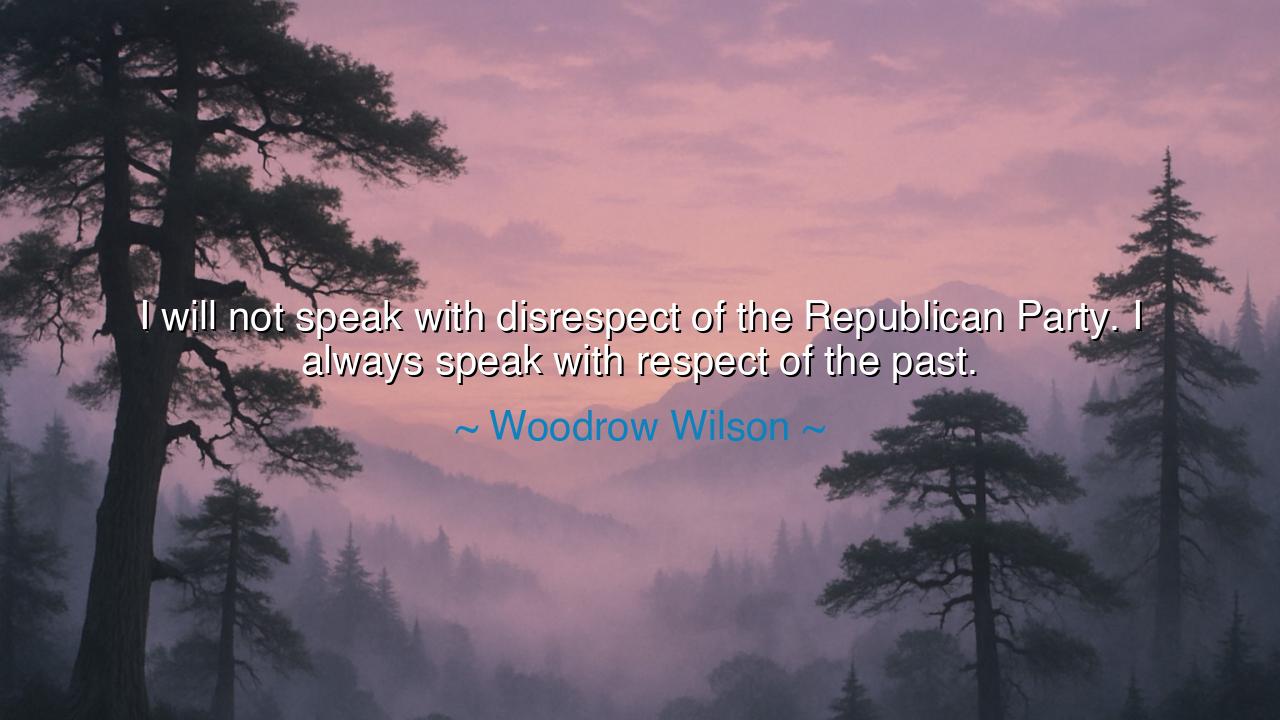
I will not speak with disrespect of the Republican Party. I
I will not speak with disrespect of the Republican Party. I always speak with respect of the past.






When Woodrow Wilson declared, “I will not speak with disrespect of the Republican Party. I always speak with respect of the past,” he revealed a truth that transcends politics and pierces to the heart of human memory: that the past, with all its struggles, triumphs, and errors, must be honored, not scorned. In his words there is both wisdom and restraint, a recognition that history is the soil from which the present grows, and that to speak ill of it is to deny the roots that nourish our own age.
The Republican Party, at the time Wilson spoke, was not merely a rival political faction; it was the party of Lincoln, the party that had preserved the Union through civil war, that had broken the chains of slavery, and that had guided America through some of its most perilous trials. To Wilson, a Democrat, it would have been easy to deride political opponents. But he chose instead to honor the past, to acknowledge the legacy of a party that had once carried the torch of liberty and preserved the republic in its darkest hour. In this, he demonstrated not only political wisdom but also moral maturity.
The ancients knew well that to despise the past is to invite ruin. In Greece, those who mocked their forefathers often found their cities weakened, for they forgot the lessons bought with blood and struggle. In Rome, Cicero taught that history is the teacher of life, and that reverence for the past was the foundation of civic virtue. Wilson’s words echo this ancient teaching: that true strength comes not from contempt, but from gratitude for the sacrifices of those who came before.
Consider the example of George Washington, who, when he left the presidency, warned against the dangers of partisanship. He understood that political factions may rise and fall, but the republic endures only if its citizens honor the greater whole. Wilson’s refusal to speak with disrespect mirrors this principle: rivalry may sharpen debate, but scorn erodes unity. To respect the past, even of one’s adversaries, is to preserve the dignity of the nation itself.
The deeper meaning of Wilson’s words lies in the balance between criticism and reverence. One may oppose the present actions of a party or a person, yet still honor the legacy of what they once achieved. This requires discernment and humility: the ability to see beyond the narrow conflicts of today and to remember the broader arc of history. Without this perspective, we risk descending into bitterness, where every rival is an enemy, and every past achievement is forgotten.
For us, the lesson is clear: in our own lives, we must resist the temptation to belittle the past—whether of nations, institutions, or even of ourselves. To reject the past with contempt is to sever ourselves from our own foundation. Instead, we must learn to honor what was good, to acknowledge what was flawed, and to build upon it with wisdom. Respect for the past does not mean blindness to its errors; it means gratitude for its gifts and humility in its lessons.
Practical wisdom follows: in times of conflict, whether political, personal, or professional, do not allow rivalry to become scorn. Acknowledge the contributions of those you disagree with, for respect disarms hostility and opens the door to dialogue. Study the past with reverence, not to cling to it, but to draw strength for the future. And in your own journey, treat your earlier self not with shame, but with compassion, for even your failures prepared the ground for your growth.
Thus, Wilson’s words stand as a reminder for all ages: do not dishonor the past, for it is the parent of the present. Respect, even for rivals, preserves dignity; reverence for history anchors wisdom. Let us therefore walk forward as Wilson counseled—not scorning the past, but honoring it, and in that honor, finding the strength to shape a better tomorrow.






AAdministratorAdministrator
Welcome, honored guests. Please leave a comment, we will respond soon